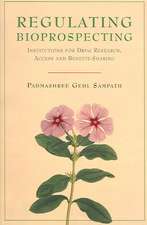Approaches to Plant Stress and their Management
Editat de R. K. Gaur, Pradeep Sharmaen Limba Engleză Hardback – 15 dec 2013
| Toate formatele și edițiile | Preț | Express |
|---|---|---|
| Paperback (1) | 794.21 lei 38-44 zile | |
| Springer India – 16 sep 2016 | 794.21 lei 38-44 zile | |
| Hardback (1) | 962.49 lei 6-8 săpt. | |
| Springer India – 15 dec 2013 | 962.49 lei 6-8 săpt. |
Preț: 962.49 lei
Preț vechi: 1173.77 lei
-18% Nou
Puncte Express: 1444
Preț estimativ în valută:
184.19€ • 200.01$ • 154.72£
184.19€ • 200.01$ • 154.72£
Carte tipărită la comandă
Livrare economică 23 aprilie-07 mai
Preluare comenzi: 021 569.72.76
Specificații
ISBN-13: 9788132216193
ISBN-10: 8132216199
Pagini: 450
Ilustrații: XVII, 396 p. 61 illus., 39 illus. in color.
Dimensiuni: 178 x 254 x 30 mm
Greutate: 0.93 kg
Ediția:2014
Editura: Springer India
Colecția Springer
Locul publicării:New Delhi, India
ISBN-10: 8132216199
Pagini: 450
Ilustrații: XVII, 396 p. 61 illus., 39 illus. in color.
Dimensiuni: 178 x 254 x 30 mm
Greutate: 0.93 kg
Ediția:2014
Editura: Springer India
Colecția Springer
Locul publicării:New Delhi, India
Public țintă
ResearchCuprins
1. Integrated management of polluted soils for enhancing productivity and quality of crops.- 2. Targeting Of Metabolic Pathways For Genetic Engineering To Combat Abiotic Stress Tolerance In Crop Plants.- 3. Role of organic and inorganic chemicals in plant-stress mitigation.- 4. Role of Calcium/Calmodulin in plant stress response and Signaling.- 5. Herbicide resistance in Phalaris minor and genetic-medication in crop.- 6. Phenology modeling and GIS applications in pest management: A tool for studying and understanding insect pest dynamics in the context of global climate change.- 7. Influence Of Moisture Stress On Growth, Development, Physiological Process And Quality Of Fruits And Vegetables And Its Management Strategies.- 8. Plant Water-Stress Response Mechanisms.- 9. Abiotic stresses in major pulses: Current status and Strategies.- 10. Photosynthesis and associated aspects under abiotic stresses environment.- 11. The effects of drought on plant communities in the desert rangelands of Tunisia.- 12. Effect Of Cold Stress On Photosynthesis Of Plants And Possible Protection Mechanisms.- 13. Oxidative Stress In Plants And Its Management.- 14. Weed Stress In Plants.- 15. Heavy Metals Stress on Poplar: Molecular and Anatomical Modifications.- 16. Molecular mechanism of benign microbe-elicited alleviation of biotic and abiotic stresses for plants.- 17. MAPK Signaling cascades and transcriptional reprogramming in plant – pathogen interactions.- 18. An Overview Of Antiviral RNA Silencing In Plant: Biogenesis, Host-Virus Interaction And Potential Applications.- 19. Fungal Disease Management in Plants.- 20. Systemic Infection of Potyvirus: A Compatible interaction between host and Viral Proteins.- 21. Bioinformatics Resources for the Management of Biological Information on Plant Responses towards Stresses.- 22. Genomics Based Analyses Of Environmental Stresses In Crop Plants.
Recenzii
“This book is a comprehensive study and discussion about the plant stresses and their management aspects. … the book is suitable for policy makers, researchers, undergraduate and graduate students of, plant and soil science, and environmental sciences.” (Ram Swaroop Meena, Journal of Cleaner Production, Vol. 102, September, 2015)
Notă biografică
Dr. Rajarshi Kumar Gaur is presently working as Head and Associate Professor, Department of Science, Mody Institute of Technology and Science (Deemed University), Lakshmangarh, Sikar, Rajasthan, India. He has partially characterized three sugarcane viruses viz., sugarcane mosaic virus, sugarcane streak mosaic virus and sugarcane yellow luteovirus.He worked on development of marker-free transgenic plants against cucumber viruses. He has made significant contributions on sugarcane viruses and published 80 national/international papers and presented near about 45 papers in the national and international conferences.
Dr. Pradeep Sharma is working as Senior Scientist (Biotechnology) at Directorate of Wheat Research, Karnal, India. Dr. Sharma has made significant contribution in geminiviruses from South East Asia and published more than 80 national and international research papers, invited chapters, reviews and edited three books in biotechnology and geminivirology. He has studied the role of suppressors encoded by monopartite Tomato leaf curl Java and Ageratum yellow vein begomoviruses.Currently, he is working on functional genomics, small RNAs and bioinformatics of wheat.
Dr. Pradeep Sharma is working as Senior Scientist (Biotechnology) at Directorate of Wheat Research, Karnal, India. Dr. Sharma has made significant contribution in geminiviruses from South East Asia and published more than 80 national and international research papers, invited chapters, reviews and edited three books in biotechnology and geminivirology. He has studied the role of suppressors encoded by monopartite Tomato leaf curl Java and Ageratum yellow vein begomoviruses.Currently, he is working on functional genomics, small RNAs and bioinformatics of wheat.
Textul de pe ultima copertă
Plant stresses are serious threats to the sustainability of crop yields accounting for more crop productivity losses than any other factor in rainfed agriculture. Post-harvest losses mean surplus crops do not reach market, affecting the livelihoods of farming families, and too often these families are left with no other option than to eat contaminated stored food. These constraints impact the food security of these farming families as well as the communities and countries in which they live. This book is the demonstration of a clear synergistic effect of stresses, an effect that was unexpectedly as important as either stress applied alone. This book will add to our current knowledge of abiotic stress response in plants and will provide the groundwork necessary to build future strategies for crop enhancement. The fundamental principles that underpin all biotechnology are explained and a full range of examples discussed to show how these principles are applied; from starting substrate to final product. It will be beneficial to both plant breeders and molecular biologists, because it combines the topics of physiology, tolerance genes, and breeding methods. When these topics are presented together, it is easy to compare all aspects of tolerance mechanisms and breeding methods for abiotic stresses. These comparisons are useful to understand which pathways or which genes are important for rendering more tolerance to a certain abiotic stress, and to bring forward new ideas for improving the tolerance. Features •Cover both plant biotic and abiotic stresses •Important factors in managing crops for water stress conditions •Substantially increase the sustainable productivity of smallholder farmers in developing countries •Genetic and biochemical approaches – if those approaches constitute a substantial improvement on current practices.
Caracteristici
The book provides the most recent information regarding advances in genetics and physiology of abiotic stress response and crop improvement
Emphasizes on genes of importance for rendering more tolerance to a certain abiotic stress, and brings forward new ideas for improving the tolerance
Beneficial to both plant breeders and molecular biologists because it combines the topics of mathematical modelling, physiology, tolerance genes, and breeding methods
Emphasizes on genes of importance for rendering more tolerance to a certain abiotic stress, and brings forward new ideas for improving the tolerance
Beneficial to both plant breeders and molecular biologists because it combines the topics of mathematical modelling, physiology, tolerance genes, and breeding methods








